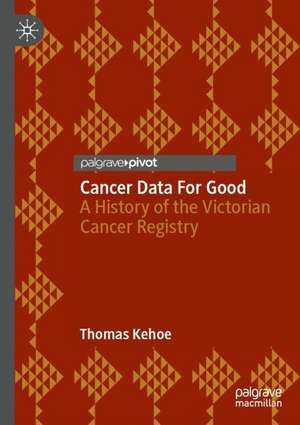Cancer Data For Good: A History of the Victorian Cancer Registry
Autor Thomas Kehoeen Limba Engleză Hardback – 27 oct 2022
Preț: 352.59 lei
Nou
Puncte Express: 529
Preț estimativ în valută:
67.47€ • 70.05$ • 56.26£
67.47€ • 70.05$ • 56.26£
Carte tipărită la comandă
Livrare economică 22 martie-05 aprilie
Preluare comenzi: 021 569.72.76
Specificații
ISBN-13: 9789811949869
ISBN-10: 9811949867
Pagini: 156
Ilustrații: XVI, 156 p. 2 illus.
Dimensiuni: 148 x 210 mm
Greutate: 0.36 kg
Ediția:1st ed. 2022
Editura: Springer Nature Singapore
Colecția Palgrave Macmillan
Locul publicării:Singapore, Singapore
ISBN-10: 9811949867
Pagini: 156
Ilustrații: XVI, 156 p. 2 illus.
Dimensiuni: 148 x 210 mm
Greutate: 0.36 kg
Ediția:1st ed. 2022
Editura: Springer Nature Singapore
Colecția Palgrave Macmillan
Locul publicării:Singapore, Singapore
Cuprins
1. Cancer Registration: A Neglected History.- 2. A Thirst for Data: Establishing the Victorian Cancer Registry, 1936-1945.- 3.Post-War Recovery, Expansion, and Technological Advancement, 1945-1968.- 4. The “Gray” Years: Technological Advancement and Legislative Change, 1968-1981.- 5.New possibilities: The VCR as a population-based registry, 1981-1990.- 6. The VCR as a Tool for Population Research and Intervention, 1991-2010.- 7. Towards the future: New leadership and state of the art technology, 2011-2019.
Notă biografică
Dr Thomas Kehoe is a modern historian and since 2020, has headed the Heritage Project at Cancer Council Victoria. In this role, he works with other scholars, museums, and archives to reveal the long and challenging history of cancer control in Victoria and its impact on modern health. Prior to joining the Council, he was Postdoctoral Research Fellow at the University of New England and taught modern history, politics, and criminology at the University of Melbourne, the Australian Catholic University, and Swinburne University of Technology (Australia).
Textul de pe ultima copertă
This book examines the history of the Victorian Cancer Registry (VCR) in Australia from its establishment in the late 1930s through to the present day. It sheds new light on the history of medicine and the broader social and cultural histories affected by advances in cancer control science, providing a historical account of cancer registration that is empirically grounded in new archival and oral sources. It addresses the obstacles that proponents of cancer registration faced, how governments came to support permanent registries, and the subsequent contributions of the VCR and other registries to cancer research. In charting this history, the book discusses some of the political, social, and cultural implications of registry-driven science, and the links between developments in scientific knowledge and campaigning for policy changes around cancer.
Dr Thomas Kehoe is a modern historian and since 2020, has headed the Heritage Projectat Cancer Council Victoria. In this role, he works with other scholars, museums, and archives to reveal the long and challenging history of cancer control in Victoria and its impact on modern health. Prior to joining the Council, he was postdoctoral research fellow at the University of New England and taught modern history, politics, and criminology at the University of Melbourne, the Australian Catholic University, and Swinburne University of Technology (Australia).
Caracteristici
Sheds new light on an important part of the history of science and medical history Uses a rich collection of previously unexamined archival material Illustrates broader political, social, and cultural implications of registry-driven science
